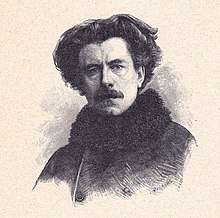Maurice Rollinat
Maurice Rollinat (December 29, 1846 in Châteauroux, Indre – October 26, 1903 in Ivry-sur-Seine) was a French poet.

Early works
His father represented Indre in the National Assembly of 1848, and was a friend of George Sand, whose influence is very marked in young Rollinat's first volume, Dans les brandes (1877), and to whom it was dedicated.
Brief fame
After its publication, he abandoned realism and worked in a very different manner. He joined a literary circle that called themselves Les Hydropathes, founded by Émile Goudeau, an anti-clerical group with ties to the decadent literary movement. Under their influence wrote the poems that made his reputation. In Les Névroses, with the sub-title Les Âmes, Les Luxures, Les Refuges, Les Spectres, Les Ténèbres, he showed himself as a disciple of Charles Baudelaire. He constantly returns in these poems to the physical horrors of death, and is obsessed by unpleasant images. Less outre in sentiment are L'Abîme (1886), La Nature, and a book of children's verse, Le Livre de la Nature (1893).
He was musician as well as poet, and set many of his songs to music. Several evenings a week, Rollinat would appear at the cabaret Le Chat Noir, and there he would perform his poems with piano accompaniment. His gaunt and pale appearance made his portrait a favourite subject for a number of painters, and the startling subjects of his verses brought him short lived fame; at the height of his popularity he drew a number of celebrities to the cabaret to see him perform; among them were Leconte de Lisle and Oscar Wilde. Rollinat's friend Jules Barbey d'Aurevilly wrote that "Rollinat might be Baudelaire's superior in the sincerity and depth of his diabolism".
Rollinat married the actress Cécile Pouettre. He lost his reason in consequence of his wife's death from rabies; after several suicide attempts, he died in an insane asylum at Ivry-sur-Seine. He is buried in the Saint-Denis cemetery in Châteauroux.
On Rollinat's death, Auguste Rodin offered the Fresselines commune a bas-relief entitled "Poet and the Muse". This sculpture is on display on the wall of the village church at Crozant.
Publications
- 1877 : Dans les brandes
- 1883 : Les Névroses
- 1886 : L'Abîme
- 1887 : Dix mélodies nouvelles
- 1892 : La Nature
- 1893 : Le Livre de la nature (anthology)
- 1896 : Les Apparitions
- 1898 : Ce que dit la Vie et ce que dit la Mort
- 1899 : Paysages et paysans
- 1903 : En errant, proses d'un solitaire
Posthumes
- 1904 : Ruminations : proses d'un solitaire
- 1911 : Les Bêtes
Contemporary editions
- Œuvres (éditées par R. Miannay - 1977) - Lettres Modernes Minard :
- I. Dans les brandes (1877)
- II. Les Névrôses (1883)
References

- Régis Miannay, Maurice Rollinat, poète et musicien du fantastique, Badel, 1981.
- Hugues Lapaire, Rollinat, poète et musicien, Mellotté, 1932.
- Claire Le Guillou, Rollinat : ses amitiés artistiques, Joca seria, 2004.
- Association des amis de M. Rollinat, Actes du colloque 1996 (The hundredth anniversary of the poet's birth), 2005.
External links
| French Wikisource has original text related to this article: |
| Wikimedia Commons has media related to Maurice Rollinat. |
- Biography and several poems (in French)
- A selection of his verse (in French)
- Free scores by Maurice Rollinat at the International Music Score Library Project (IMSLP)
- Works by or about Maurice Rollinat at Internet Archive
- Works by Maurice Rollinat at LibriVox (public domain audiobooks)
